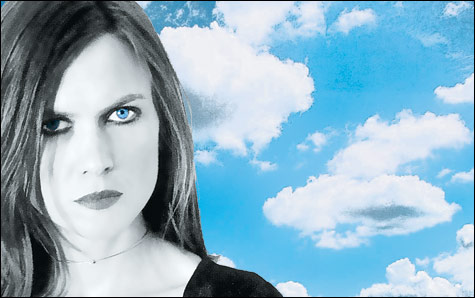 |
I was living in New York in the mid 1990s, gearing up for a short tour of mostly college venues in New England, to warm up for a series of European dates promoting my Only Everything album, after which there would be still more shows in North America. In the weeks leading up to the start of the college tour, I fell into one of my depressions, and with it some strange and disconcerting new sensations presented themselves: I would wake up every morning at 4 am — regardless of when I had gone to bed the night before — suddenly wide awake, unable to sleep anymore. Once out of bed, facing the day, a pervasive inner agitation, like tiny wheels in my brain were moving way too fast, made it impossible for me to concentrate, on anything. Not on my writing, not on any book or even a magazine, not on any one continuous thought, not even on the most mindless TV show. So I had no way to distract myself from the awful, oppressive gloom I felt. At the same time, I had no physical energy. I felt weighted down and slow, and the air, inside and out, seemed thicker than normal, like a dense fog. My movements, my reactions, and even my speech were leaden.I would sit on my couch looking out the window at the sky, grinding my teeth, too frozen in mute, silent terror to cry or even to move, really, and completely saturated with dread, worrying — believing — that the sun might not come up the next morning or that it would drop out of the sky and leave the world dark and cold and dead, like my spirit.
As usual, I didn’t know where these feelings had come from and I didn’t know how to make them go away. I was alone in New York. I had failed to make any real friends in the year I’d been living there. (I only ever left my apartment to buy food or to work out at my health club a few blocks away.) I didn’t have any kind of therapist, nor was I in the habit of confiding in anyone in my family, which was scattered around the country. I had no one to talk to, really, and what was happening to me was worse and more frightening than any depression I had ever experienced before.
It felt like this time, unlike all the others, the cloud wasn’t going to dissipate. This infernal woe had spread its poison all through my brain and body, as well as the city and sky, and I couldn’t see any way out. And I had to go on tour. It was all planned and scheduled and arranged. I guessed going on the road would be no worse than sitting in my apartment waiting for the end of the world, alone.
It’s so difficult to describe a bad depression. Even if one could capture it in all its blank, dead horror, she would know that there was not really any point in telling anyone else. Talking about how one’s blood has run cold, or dry, or black, doesn’t bring any relief. It’s as tedious for the sufferer as for the listener. Telling someone is only burdening him with a big problem that doesn’t appear to have any solution: it hurts to be awake. The morbidly depressed person’s only hope is for unconsciousness; for the gift of sleep to free her for the requisite seven or eight hours each night. Even then, disrupted or stunted sleep is often part of the problem.
So I set out on tour promoting Only Everything, lugging my sluggish body from campus to campus, from stage to stage, from hotel to hotel, and so on, while consumed every waking second with the utter, definitive hopelessness and worthlessness of everything; of the future, of today, of the past. The ubiquitous, homely Wal-Marts and McDonalds and Taco Bells and Best Buys and Staples sprouting up out of every roadside like poisonous, monster weeds seemed, in my funk, justifiable enough reason for anyone to shoot herself in the head.
The suicide note might read: “I did it because of all the Wal-Marts.”
Tragic broccoli and bear
At the northeastern colleges I was visiting, I saw the inevitable death in every student’s clean-scrubbed, innocent, smiling face. At NYU, the refreshments the student concert committee had set up for me and my band and crew — a bag of tortilla chips; a jar of salsa; a Saran-wrapped plastic supermarket deli platter of dried-out, precut broccoli florets, baby carrots, celery, et cetera, arranged in sections in cubbies around a centrally located foil-covered container of “dip”; a bunch of Budweiser bottles that had been shoved upright into the ice in a plastic tub to chill them — was the most tragic thing I had ever seen.